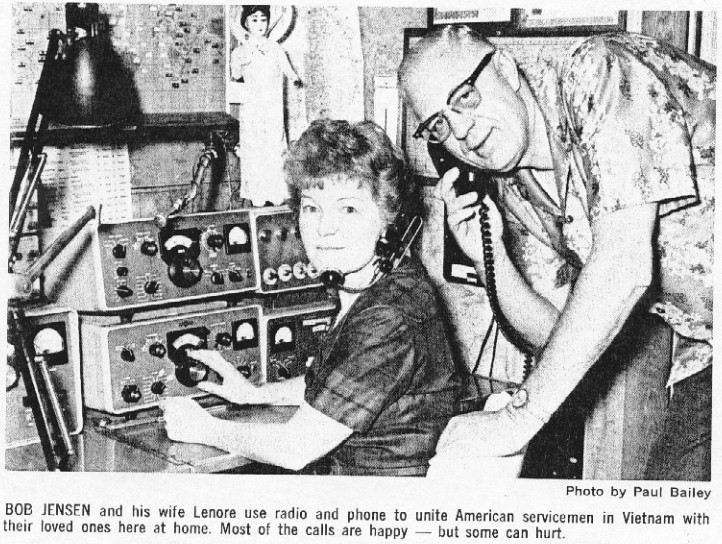|
Jensens Bring Voices of Love |
|
Studio Engineer Bob Jensen and his wife, actress Lenore Kingston, spend most of their spare time helping the servicemen in Vietnam — and they do it all from their home here in Sherman Oaks. Bob and Lenore are licensed ham operators and have been selected by our military as MARS operators. MARS stands for Military Affiliate Radio Sys-stem, the system which allows GIs to talk by radio and phone with their loved ones here at home. "Lenore is one of the few people I know who can really be called a servant of their fellow man," says Bob. "She spends from five to seven hours a day on that radio, seven days a week." If a serviceman in Vietnam wants to talk to a loved one at home he applies to MARS and is given a time and date. He reports to a spot in Vietnam (it could be a hospital, Saigon building, or jungle shack) and waits for a MARS operator here to check in. When Lenore gives her call letters, A6NAZ, she'll hear that distant voice answer, "Okay, Lenore. Let's go." The MARS man then gives her the name of the party to be contacted in America, and the phone number. Lenore then works with a phone operator to get in touch with the party. She explains what's going on, and how to talk on a MARS hook-up, and then gives the soldier and his family four minutes of talking time. Lenore handles between 30 and 35 calls a day, and says that most of them give her a good feeling. But there are some that hurt. "It's awful when a boy is waiting over there and I have to report that the party here either doesn't answer, or the line is busy," says Lenore. About a third of her calls come from hospitals, where wounded young soldiers want to reassure their family that they're okay. Some of the calls are to announce that a serviceman is coming home, and others are to arrange a meeting place in Hawaii when they get their six-day rest period. She recently had to put through a MARS call from a wounded soldier who wanted to talk to his mother before surgery. The military operator explained to Lenore that the boy was only an hour away from surgery in which his arm would be amputated. Before connecting the mother and son Lenore took time to explain to the mother that her son was about to lose his arm, and that he was going to need cheer and comfort — not tears. "The call started just like all the rest," says Bob. "They made small talk and chatted about the weather. Then the boy paused and said, 'Mom. They're going to take my arm off in a few minutes.' The remark was followed by about 10 seconds of dead air, and then the mother said, 'You'll be fine, son. When do you think you'll be coming home?' The boy wasn't afraid after that." Back to Top |
NBC Newsline
